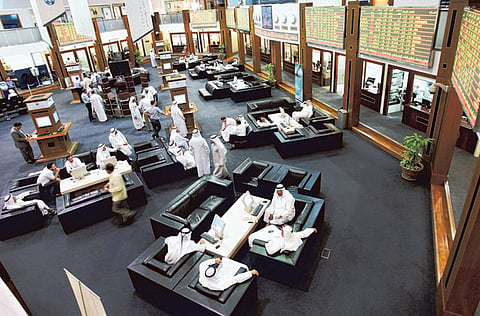Risks attached to GCC rebound
GCC economic rebound still fraught with risks

You know for sure that autumn is here and it’s back to serious business when banks and brokers deliver hefty research documents to your electronic door. Mailboxes are at risk of buckling under the strain.
In the case of the Gulf economy, the message that comes through loud and clear from the outpouring of data, commentary and charts is a familiar one: a relatively firm recovery path based on buoyant oil revenues, and fiscal and balance of payments surpluses that convert handily into government expenditures.
Emirates NBD’s latest quarterly research gives a forecast of 5.1 per cent GDP growth for the GCC this year, not quite matching the 6.7 per cent of developing Asia but in a different league to the 1.3 per cent predicted for what the IMF calls the advanced economies.
To complement the budgetary impetus, monetary policy is set easy, by reference to the US dollar peg, though qualifiable if necessary by controls.
Behind those settings are the money and credit data that relate to the fundamental condition, regulatory governance and portfolio practices of the banking system, which are not nearly so expansionary, given the experience and legacy of the global financial crisis, now itself so routinely cited that it has its own moniker, apparently (‘GFC’).
Reflationary bubble
Those observers concerned that the Gulf should not re-ignite another short-term reflationary bubble but instead concentrate upon structural shifts for better, longer medium-term prospects will wheel out terms like rebalancing and sustainability.
They will note that, as Standard Chartered’s most recent regional Mena focus has identified, an unfortunate flipside of the momentum sponsored by the state is that the private sector struggles to compete against public sector wage levels.
Alia Moubayed, senior Mena economist at Barclays, advised me last week, “The need to make further progress on economic diversification in the GCC will become a more pressing issue, as oil & gas production hits peak levels. Budget rigidities have increased significantly, and non-oil fiscal balances widened.”
But in any case, while those alternative growth models may be whirring away in the background, a lot of attention in the meantime will still be paid to whether the real estate market is on the up again.
Signs are that it is, although the reports of consultancy findings in the UAE, for instance, are unclear whether the rebound in rents and prices is clearer on the budget or the premium side of the spectrum.
Stock market
Equally, there remains natural concern whether the stock market, another vehicle and expression of confidence, will get back to winning ways. Unfortunately, like the region’s exposure to global trade trends, that does still depend on international forces, particularly the benchmark of US equities.
The world is still extraordinarily devoted to the pattern set by the American markets. Global indices respond pretty much in kneejerk fashion to US bonds or the S&P 500, despite the different and often more inspiring stories to be found in emerging markets particularly.
That’s not just because the US has been the rest of the world’s customer to an extraordinary degree for decades now, and has a credit card bill so enormous that its counterpart lenders and exporters are potentially the ones over a barrel.
It’s also because of the iconic symbol and enduring exchangeability of the US dollar, which has proven itself through the GFC in safe haven terms (see box).
Andreas Kolbe, credit strategist at Barclays, advises “High-quality GCC sovereigns, especially Qatar, trade with high correlation to US Treasuries. Tight absolute spreads leave little room to compensate for asymmetric US Treasury risk, as well as supply and geopolitical tail risks.”
That’s fair warning of the region’s vulnerability to volatile funds flows. There’s an interesting rider, though.
“GCC corporates seem less sensitive to US Treasuries, and should be better sheltered against a potential rise in yields.”
So, for investors anyway, diversification of another sort just might save them on the day of dollar reckoning.


